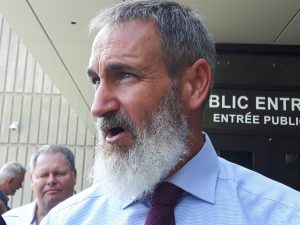Following an injunction banning interference with the operation of North Kent Wind, Water Wells First is changing course, slightly. 
A judge has banned blockades and protests at its turbine sites in Chatham-Kent.
Mark MacKew, lawyer for Water Wells First and spokesman Kevin Jakubec, says the battle lines have been drawn.
“Oddly enough, it looks like it’s contingent upon the water well owners to prove this is more than a coincidence,” MacKew says. “We have to prove causation, one would think that the Ministry of Environment and Climate Change would be doing that, but it looks like it falls onto us.”
MacKew says Water Wells First will be shifting its focus to spending money on legal recourse to finding scientific evidence.
“It’s more than common sense that water you can chew isn’t good for you,” MacKew says.
Water Wells spokesman Kevin Jakubec says class action lawsuits are still a possibility.
“A suit going after them for damages is still wide open to everyone who has an affected well,” “Protests directed at the Ministry of Environment would be the appropriate stage if the Ministry (continues) to deny looking at the sediments.”
MOECC and local public health officials have said that there is no need to examine sediment in affected wells because only particles that dissolve in water would be considered a health risk.
Jakubec says he plans to keep the pressure on on the Ministry of Environment and Climate Change, and hopes to meet with provincial officials and affected families later this week.
So far, Jakubec says 13 complaints have been filed about well contamination following construction of turbine foundations.
For its part, North Kent Wind issued a statement saying it respects the right of citizens who disagree with renewable wind energy or the project to have their voices heard.




